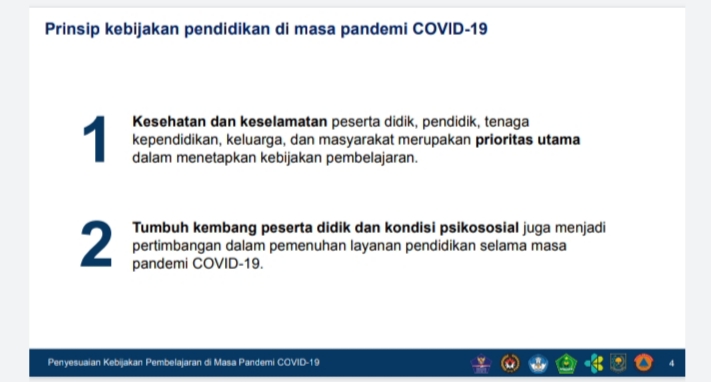Gov’t Announces Adjustments to Joint Ministerial Decree on Learning Guidelines during Covid-19 Pandemic

Screenshot of learning adjustment during the Covid-19 pandemic.
The Indonesian Government has made adjustments to the Joint Ministerial Decree (SKB) of Four Ministers on the learning implementation in yellow and green zones. Those in the zones are able to carry out face-to-face learning under very strict health protocols.
The change took into account the learning needs, various inputs from experts and organizations as well as an evaluation of the implementation of the Joint Ministerial Decree.
“The Government prioritizes the health and safety of students, educators, education personnel, families, and society in general, as well as the growth and development of students and psychosocial conditions in an effort to fulfill educational services during the Covid-19 pandemic,” Minister of Education and Culture Nadiem Anwar Makarim said in a media briefing on Adjusting Learning Policies during the Covid-19 Pandemic, Jakarta, Friday, (7/8).
Areas in the orange and red zones are prohibited from doing face-to-face learning in educational units thus must continue to learn from home (BDR).
As of 3 August 2020, based on data from http://covid19.go.id, around 57 percent of students are still in the red and orange zones, while the rest are in the yellow and green zones.
The Minister said that the conditions have prohibited teaching and learning activities to take place normally. There are hundreds of thousands of schools closed to prevent Covid-19 spreading. Around 68 million students are engaged in learning from home while around four million teachers are engaged in remote teaching.
Some issues in the implementation of Distance Learning (PJJ) include the difficulty of teachers in managing PJJ. The teachers are still focusing on completing the curriculum. Meanwhile, not all parents are able to assist their children to study at home optimally.
“The students also experience difficulty in concentrating as well as an increase in boredom which has the potential to cause mental health problems,” the Minister said.
To anticipate, the Government issued zoning adjustments for face-to-face learning. In the amendment to the Joint Ministerial Decree, the face-to-face learning permit was extended to the yellow zone.
The face-to-face learning decision-making procedure is still carried out in stages as in the previous Joint Decree. Local governments/offices/regional offices of Ministry of Religious Affairs and schools have full authority to determine whether regions or schools can begin face-to-face learning. “So it does not mean that the schools in the green or yellow zone are obliged to start meeting face to face again,” the Minister explained.
Nadiem also emphasized that parents or guardians can decide for their children whether their children will start face-to-face learning or not.
The determination of regional zoning itself still refers to the regional risk mapping carried out by the national Covid-19 handling task force, which can be accessed on the https://covid19.go.id/peta-risiko page. Based on this mapping, regional zoning was carried out at the regency/city level. “Excluded for small islands, the zoning uses regional risk mapping carried out by the local Covid-19 task force,” he said.
The stages of face-to-face learning for educational units in the green and yellow zones in the adjusted Joint Ministerial Decree are carried out simultaneously at the primary and secondary education levels with consideration of health risks that do not differ for age groups at the two levels. Meanwhile, early childhood education can start face-to-face learning the soonest in two months after primary and secondary education.
“In addition, with the consideration that practical learning is a core skill of vocational schools, the implementation of practical learning for vocational students is allowed in all zones by obliging to implement strict health protocols,” Nadiem said.
Madrasas and boarding schools in the green and yellow zones, he said, can open dormitories and carry out face-to-face learning gradually since the transition period. The dormitory with a capacity of less than or equal to 100 people, during the first month of the transition period, shall only be 50 percent occupied. During the second month, it can be 100 percent occupied. Meanwhile, the dormitory with a capacity of more than 100 people should only be 25 percent occupied in the first month, 50 percent in the second month, 75 percent in the third month, and 100 percent in the fourth month.
“Evaluation will always be carried out to prioritize health and safety. The Education Office, Provincial or Regency/City Health Office, together with Head of the Education Unit will continue to coordinate with the task force to accelerate the handling of Covid-19, to monitor the level of risk of Covid-19 in the regions,” he added.
“If it is indicated unsafe, for example there are confirmed cases of Covid-19, or the level of risk in the area turns orange or red, the education unit must be closed again,” he concluded. (Cooperation and Public Relations Bureau to Ministry of Education and Culture/EN)
Translated by: Fairuzzamani Inayatillah
Reviewed by: Mia M. Bonaedy








